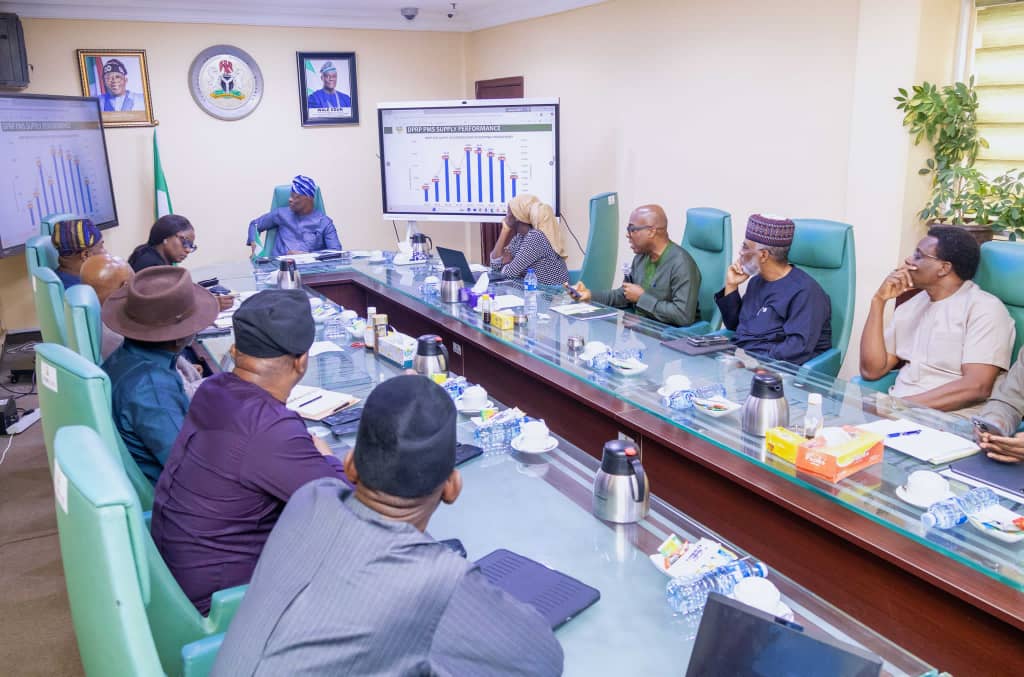By Oladosu Adebola Oluwaseun
The Federal Ministry of Finance in Abuja recently convened a follow-up meeting of its Technical Sub-Committee dedicated to the implementation of a groundbreaking policy: the sale of crude oil and refined petroleum products in Naira. Chaired by the Honourable Minister of Finance and Coordinating Minister of the Economy, Mr. Wale Edun, this session served as a crucial platform to assess the progress made since the initiative’s inception and the preceding committee engagement. The outcomes of the meeting signal a positive trajectory for a policy deeply embedded in President Bola Tinubu’s overarching economic strategy.
The high-level meeting witnessed the active participation of key stakeholders, underscoring the collaborative spirit driving this initiative. Alongside Minister Edun, the Executive Chairman of the Federal Inland Revenue Service (FIRS) and Chairman of the Technical Sub-Committee, Mr. Zacch Adedeji, played a pivotal role. The presence of the Special Adviser to the President on Energy, Ms. Olu Verheijen, further highlighted the strategic importance of the policy within the energy sector. Senior representatives from the Nigerian National Petroleum Company Limited (NNPCL), the central player in Nigeria’s oil and gas industry, contributed their operational insights. The inclusion of local refining operators demonstrated the commitment to bolstering domestic refining capacity. Crucially, key regulatory bodies such as the Nigerian Midstream and Downstream Petroleum Regulatory Authority (NMDPRA), the Nigerian Upstream Petroleum Regulatory Commission (NUPRC), and the Nigerian Ports Authority (NPA) were actively involved, ensuring a coordinated and compliant implementation process across the value chain.
At the heart of this policy lies a multi-pronged objective, strategically designed to address some of Nigeria’s most pressing economic challenges. The primary aim is to fortify the Naira, Nigeria’s national currency, which has faced considerable volatility in recent times. By denominating the sale of the nation’s primary export commodity and its refined derivatives in Naira, the policy seeks to reduce the reliance on foreign currencies, particularly the US dollar, in domestic transactions within the oil and gas sector. This strategic shift is expected to generate increased demand for the Naira, thereby bolstering its value in the foreign exchange market.
Beyond currency stabilization, the initiative holds significant implications for Nigeria’s energy security. By fostering a domestic market for crude oil and refined products transacted in Naira, the policy aims to insulate the Nigerian economy to some extent from the vagaries of international oil price fluctuations and exchange rate risks. This increased stability in the energy sector can have cascading positive effects on other sectors of the economy, reducing uncertainty and promoting investment.
Furthermore, the policy is intrinsically linked to the broader goal of promoting local value addition within the Nigerian oil and gas sector. By encouraging domestic transactions in Naira, it incentivizes the growth and development of local refining capacity and other ancillary services within the industry. This can lead to job creation, technological advancements, and a more resilient and self-sufficient energy sector. The active participation of local refining operators in the Technical Sub-Committee meetings underscores the importance of their role in realizing this objective.The press release explicitly mentions that stakeholders “reaffirmed their shared commitment to the effective and seamless execution of the policy.” This unified stance across government agencies, the national oil company, regulatory bodies, and private sector players is a crucial ingredient for the successful implementation of such a significant economic policy shift. The emphasis on “seamless execution” suggests a focus on minimizing disruptions and ensuring a smooth transition to the new Naira-based transaction framework.
The Coordinating Minister of the Economy, Mr. Wale Edun, played a pivotal role in chairing the meeting and commended the “continued collaboration across agencies and partners.” This acknowledgment highlights the importance of inter-agency coordination and public-private partnerships in driving the success of this initiative. His commitment to providing further updates “in due course” signals a transparent and communicative approach to the implementation process, keeping the public and stakeholders informed of key developments.
While the press release provides a positive overview of the progress achieved, the intricacies of implementing such a transformative policy are significant. The Technical Sub-Committee will undoubtedly be grappling with various operational and logistical considerations. These may include establishing clear pricing mechanisms for crude oil and refined products in Naira, developing the necessary financial infrastructure to support Naira-denominated transactions, and ensuring compliance across the diverse range of stakeholders within the sector. Navigating potential resistance or challenges from international trading partners who are accustomed to dollar-denominated transactions will also be a key consideration.
The success of this Naira-based sales policy will hinge on several factors, including the consistent commitment of all stakeholders, the robustness of the supporting financial infrastructure, and the broader macroeconomic environment. If effectively implemented, this initiative has the potential to be a game-changer for the Nigerian economy, contributing significantly to Naira stability, enhanced energy security, and greater local value addition in its vital oil and gas sector. The continued engagement of the Technical Sub-Committee and the commitment to providing further updates suggest a focused and determined effort to realize the ambitious goals of this policy. The nation will be keenly watching as this bold economic experiment unfolds, with the potential to reshape Nigeria’s economic landscape for the better.
